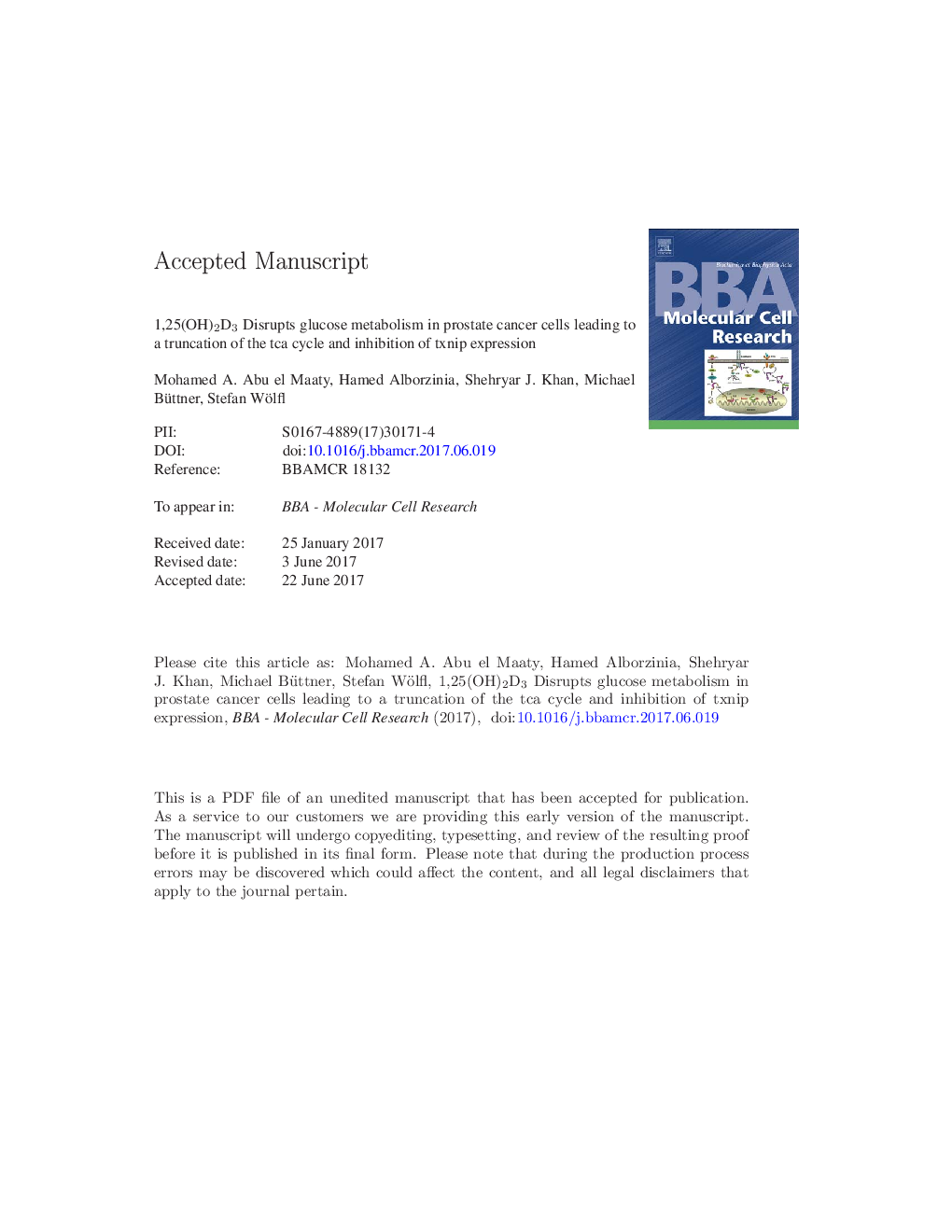| Article ID | Journal | Published Year | Pages | File Type |
|---|---|---|---|---|
| 5508823 | Biochimica et Biophysica Acta (BBA) - Molecular Cell Research | 2017 | 48 Pages |
Abstract
Prostate cell metabolism exhibits distinct profiles pre- and post-malignancy. The malignant metabolic shift converts prostate cells from “citrate-producing” to “citrate-oxidizing” cells, thereby enhancing glucose metabolism, a phenotype that contrasts classical tumoral Warburg metabolism. An on-line biosensor chip system (BIONAS 2500) was used to monitor metabolic changes (glycolysis and respiration) in response to the putative anti-cancer nutraceutical 1,25-dihydroxyvitamin D3 [1,25(OH)2D3], in different prostate cancer (PCa) cell lines (LNCaP, VCaP, DU145 and PC3). LNCaP cells exhibited profound metabolic responsiveness to the treatment and thus extensive analysis of metabolism-modulating effects of 1,25(OH)2D3 were performed, including mRNA expression analysis of key metabolic genes (e.g. GLUT1 and PDHK1), analysis of TCA cycle metabolites, glucose uptake/consumption measurements, ATP production, and mitochondrial biogenesis/activity. Altogether, data demonstrate a vivid disruption of glucose metabolism by 1,25(OH)2D3, illustrated by a decreased glucose uptake and an accumulation of citrate/isocitrate due to TCA cycle truncation. Depletion of glycolytic intermediates led to a consistent decrease in TXNIP expression in response to 1,25(OH)2D3, an effect that coincided with the activation of AMPK signaling and a reduction in c-MYC expression. Reduction in TXNIP levels in response to 1,25(OH)2D3 was rescued by an AMPK signaling inhibitor and mimicked by a MYC inhibitor highlighting the possible involvement of both pathways in mediating 1,25(OH)2D3's metabolic effects in PCa cells. Furthermore, pharmacological and genetic modulation of the androgen receptor showed similar and disparate effects on metabolic parameters compared to 1,25(OH)2D3 treatment, highlighting the AR-independent nature of 1,25(OH)2D3's metabolism-modulating effects.
Keywords
CaMKK2DGHIF12-DeoxyglucoseVDRVDUP1ACLYATP citrate lyaseG6PGLUT1TXNIPACACASDHCLDHAMLXIPLMlxPDHK1AMPKOGDHLKB1FDG-PETACCPSA1,25(OH)2D31,25-dihydroxyvitamin D3AMP-activated protein kinasePCAProstate specific antigenacetyl coA carboxylasefatty acid synthasefluorodeoxyglucose-positron emission tomographyProstate cancerhypoxia-inducible factor 1FasnLactate dehydrogenase AMetabolismthioredoxin-interacting proteinPyruvate dehydrogenase kinase 1TCA cycletricarboxylic acid cycleglucose transporter 1glucose-6-phosphateAndrogen ReceptorVitamin D receptor
Related Topics
Life Sciences
Biochemistry, Genetics and Molecular Biology
Biochemistry
Authors
Mohamed A. Abu el Maaty, Hamed Alborzinia, Shehryar J. Khan, Michael Büttner, Stefan Wölfl,
